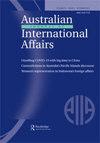Unpacking the framing of health in the United Nations Security Council
IF 1.8
3区 社会学
Q2 INTERNATIONAL RELATIONS
引用次数: 2
Abstract
ABSTRACT Traditionally falling under the remit of the World Health Organization (WHO), health issues such as health emergencies or access to healthcare have been addressed more frequently in debates and resolutions of the UN Security Council (UNSC) since 2000. As the UNSC is the UN's principal body dealing with threats and endangerments to international peace and security, this points to a certain degree of the securitisation of health. By means of a statistical analysis of UNSC speeches between 1995 and 2019 as well as by examining health-related UNSC resolutions, this research explores by whom and how health is treated as a security issue in UNSC debates. This article argues that health is increasingly paid attention to during health emergencies, displaying a narrow framing of health that follows a health security paradigm. However, health is also addressed with a focus on health systems, the wider determinants of health as well as with respect to the access to healthcare and hospitals and the protection of healthcare personnel. This points to the UNSC considering a broader understanding of public health issues to be relevant for its security agenda.打开联合国安理会健康框架
摘要传统上属于世界卫生组织(世界卫生组织)的职权范围,自2000年以来,在联合国安理会(UNSC)的辩论和决议中,诸如卫生紧急情况或获得医疗保健等卫生问题得到了更频繁的处理。由于联合国安理会是联合国处理对国际和平与安全的威胁和危害的主要机构,这表明健康在一定程度上是安全的。通过对1995年至2019年联合国安理会演讲的统计分析,以及对与健康相关的联合国安理会决议的审查,本研究探讨了在联合国安理会辩论中,谁以及如何将健康视为安全问题。这篇文章认为,在突发卫生事件中,健康越来越受到关注,显示出遵循健康安全范式的狭隘健康框架。然而,健康问题也以卫生系统、更广泛的健康决定因素以及获得医疗保健和医院以及保护医护人员为重点。这表明联合国安理会正在考虑对公共卫生问题进行更广泛的理解,以与其安全议程相关。
本文章由计算机程序翻译,如有差异,请以英文原文为准。
求助全文
约1分钟内获得全文
求助全文
来源期刊

Australian Journal of International Affairs
INTERNATIONAL RELATIONS-
CiteScore
3.20
自引率
13.30%
发文量
44
期刊介绍:
AJIA is the journal of the Australian Institute of International Affairs. The Institute was established in 1933 as an independent and non-political body and its purpose is to stimulate interest in and understanding of international affairs among its members and the general public. The aim of the Australian Journal of International Affairs is to publish high quality scholarly research on international political, social, economic and legal issues, especially (but not exclusively) within the Asia-Pacific region. The journal publishes research articles, refereed review essays and commentary and provocation pieces. ''Articles'' are traditional scholarly articles. ‘Review essays’ use newly published books as the basis to thematically examine current events in International Relations. The journal also publishes commentaries and provocations which are high quality and engaging pieces of commentary, opinion and provocation in a variety of styles. The Australian Journal of International Affairs aims to analyse international issues for an Australian readership and to present Australian perspectives to readers in other countries. While seeking to stimulate interest in and understanding of international affairs, the journal does not seek to promote any particular policies or approaches. All suitable manuscripts submitted are sent to two referees in a full ''double blind'' refereeing process.
 求助内容:
求助内容: 应助结果提醒方式:
应助结果提醒方式:


